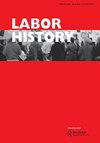克罗地亚移民制度的变化:移民复杂性的概念化,1990-2023
IF 0.7
4区 管理学
Q1 HISTORY
引用次数: 0
摘要
本文探讨了独立后克罗地亚劳动力迁移的近代史。所调查的时间段为1990-2023年,其中包括三十年,在此期间,该国经历了复杂的移民,特别是劳工移民和难民。这篇文章的目的是双重的。首先,它确定了克罗地亚移民制度的变化因素,探索如何将其融入更广泛的区域和国际移民制度。其次,它提出了一个开创性的克罗地亚移民类型学,并讨论了他们的驱动因素。文章认为,克罗地亚移民受到该国与邻国和欧盟关系变化的重大影响。若干历史、社会经济和政治结合点促成、推动和阻碍了克罗地亚移徙系统的劳工移徙和其他移徙流动。显然,独立战争、战后时期贫穷的社会经济状况以及移民到欧洲较发达地区的机会增加,都促成了克罗地亚人口的减少和其移民制度的不断变化。有人还断言,要了解克罗地亚移徙制度,就必须从长远的角度来看待移民和移徙流动之间的相互作用,以及它们如何与回返移徙重叠。本文章由计算机程序翻译,如有差异,请以英文原文为准。
Changes in the Croatian migration system: conceptualising the complexities of migrations, 1990-2023
This article explores the recent history of labour migration in post-independence Croatia. The time period under investigation is 1990–2023, which encompasses three decades during which the country has experienced complex migrations, in particular of labour migrants and refugees. The article’s ambition is twofold. First, it identifies changing elements of the Croatian migration system, exploring how it is embedded in the wider regional and international migration systems. Second, it proposes a pioneering typology of Croatian migrations and discusses their drivers. The article argues that the Croatian migrations have been significantly affected by the country’s changing affiliations to neighbouring states and the European Union. Several historical, socioeconomic and political junctions have enabled, driven and hampered labour migrations and other migratory flows of the Croatian migration system. It is evident that the war of independence, the poor socioeconomic situation in the post-war period and increased opportunities to emigrate to more developed parts of Europe have all contributed to the depopulation of Croatia and to ongoing changes in its migration system. It is also asserted that understanding the Croatian migration system necessitates a long-term perspective on the interactions between immigrant and emigrant flows, and on how they overlap with return migrations.
求助全文
通过发布文献求助,成功后即可免费获取论文全文。
去求助
来源期刊

Labor History
Multiple-
CiteScore
1.00
自引率
28.60%
发文量
44
期刊介绍:
Labor History is the pre-eminent journal for historical scholarship on labor. It is thoroughly ecumenical in its approach and showcases the work of labor historians, industrial relations scholars, labor economists, political scientists, sociologists, social movement theorists, business scholars and all others who write about labor issues. Labor History is also committed to geographical and chronological breadth. It publishes work on labor in the US and all other areas of the world. It is concerned with questions of labor in every time period, from the eighteenth century to contemporary events. Labor History provides a forum for all labor scholars, thus helping to bind together a large but fragmented area of study. By embracing all disciplines, time frames and locales, Labor History is the flagship journal of the entire field. All research articles published in the journal have undergone rigorous peer review, based on initial editor screening and refereeing by at least two anonymous referees.
 求助内容:
求助内容: 应助结果提醒方式:
应助结果提醒方式:


